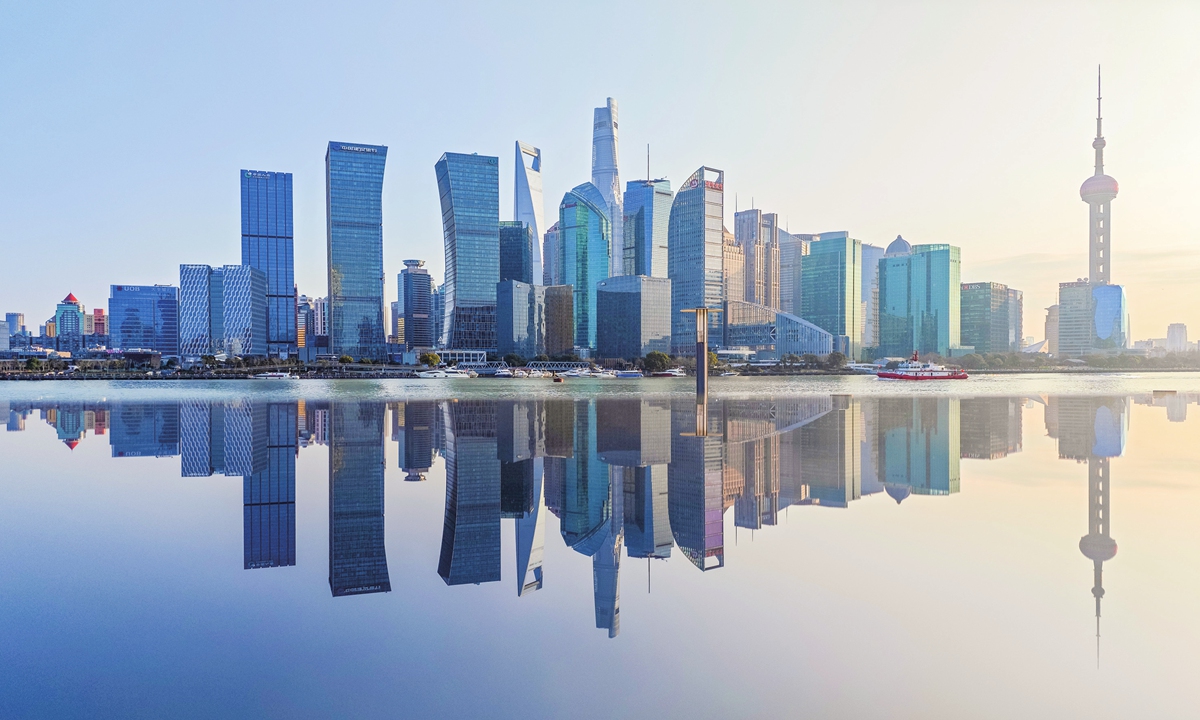
A view of the Lujiazui area in Shanghai Photo: VCG
US personal computer (PC) maker HP on Thursday became the latest foreign business that responded to allegations of planning to shift away from China, as some foreign media outlets hype rumors and claims to support their long-standing narrative of foreign businesses leaving the Chinese market.
China remains one of the most popular and stable destinations for global businesses amid a global economic downturn and rising protectionism, and the attractiveness of the Chinese market will improve further, as the country continues to open up its market and optimize the business environment, experts said.
On Wednesday, Japanese news outlet Nikkei, citing unidentified sources, reported that HP plans to shift more than half of its PC production away from China and was setting up a "backup" design hub in Singapore "in an attempt to reduce geopolitical risks."
The US PC maker swiftly refuted the alleged relocation and stressed its commitment to the Chinese market.
"We remain committed to China and our China operations, and the important role they play in our global supply chain. As part of our standard operating procedures, we regularly engage in scenario planning, exploring various options to ensure we are enhancing the agility and resiliency of our global supply chain to meet the evolving needs of our customers," HP China told the Global Times on Thursday.
Earlier on Thursday, HP told Chinese news outlet Jiemian News that China is an indispensable and key link in HP's global supply chain and it is unswervingly committed to its operations and development in China.
"In China, HP's PC manufacturing business still maintains a pivotal position, providing high-quality products and services to the global market," HP said, according to Jiemian News.
The US PC maker is only the latest foreign company in China that has been forced to refute allegations of leaving China made by some foreign media outlets. In March, South Korean chipmaker SK Hynix said that it was
not scaling back its operations in China and had not changed its China strategy, after some foreign media reports suggested that the company planned to close its Shanghai base as it "aims to reduce risks associated with the US' policies toward China."
In January, SK Hynix
denied foreign media reports suggesting that the company was selling its factory in Dalian, Northeast China's Liaoning Province.
Chinese experts said that it has become a tactic of some foreign media outlets to make baseless allegations of foreign businesses leaving China in order to support their claims that foreign businesses are "abandoning" China; however, despite the relentless smear campaign, China remains to be a very attractive market for global firms.
"Against the backdrop of the overall slowdown in world economic growth and sluggish global recovery, China maintains a very high level of foreign investment," He Weiwen, a senior fellow at the Center for China and Globalization, told the Global Times on Thursday, noting that China is among the top recipients of foreign investment despite a worldwide decline. "The Chinese market is still very attractive to foreign investment."
In the first half of 2024, foreign direct investment in China in actual use dropped 29.1 percent year-on-year to 498.91 billion yuan ($69.57 billion). However, the total amount has remained at a relatively high level over the past decade, and the decline was mainly due to a high base during the same period in 2023, an official of the Ministry of Commerce (MOFCOM) said last week, noting a 14.2 percent rise in the number of newly established foreign businesses in the country.
"Many multinational companies, including those from the US, Japan and Germany, have a large part of their supply chains in China. This also determines that foreign investment will not leave China on a large scale, and on the contrary, some new investment will come in," He said.
In the first half of 2024, foreign investment in certain sectors such as advanced technology increased significantly, with investment in medical equipment manufacturing jumping 87.5 percent year-on-year. Also notably, investment from Germany rose 18.1 percent and investment from Singapore increased 10.5 percent, according to the MOFCOM.
He said that while some foreign businesses might plan to adjust their strategies due to geopolitical risks and growing competition, it is inaccurate to claim that foreign businesses are leaving China on a large scale.
"From a global perspective, from the perspective of the entire industrial chain and supply chain, China's position is quite stable," He said, adding that China is also making efforts to further improve the environment for foreign businesses.
A communique of the Third Plenary Session of the 20th Central Committee of the Communist Party of China in July, which offered a clear window into China's reform agenda for years to come, stated that opening-up is a defining feature of Chinese modernization, and vowed to steadily expand institutional opening-up, deepen the structural reform of foreign trade, and further reform the management systems for inward and outward investment.




